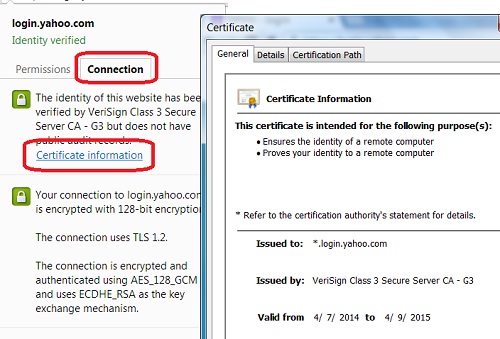PKI Tutorials - Herong's Tutorial Examples - v2.32, by Herong Yang
Archived: Viewing Server Certificate in Chrome 40
This section provides a tutorial example on how to view server certificate details when visiting an 'https' Website in Google Chrome 40.
When you visit an "https" Web server, it will send its certificate to your browser. Server's certificate is needed by the browser for 2 tasks listed below:
- Your browser must validate the certificate to determine that the Website can be trusted or not before doing any further communications.
- Your browser must use the public key in the certificate to help secure the communication messages sent and received.
Normally, your browser will do these 2 tasks automatically without your interaction. You don't need to know where is the server certificate and what's in the certificate.
But since I am interested to learn more about "https" communication, I want to see the server certificate. Here is what did on Google Chrome to see details of the server certificate.
1. Run Google Chrome and go to https://login.yahoo.com and wait for the log in page to be displayed.
2. Click the lock icon at the left side of the URL address area. The page security dialog box shows up.
3. Click the "Connection" tab. The connection security information is displayed.
4. Click the "Certificate information" link. The Certificate dialog box shows up. The General tab tells me this information:
This certificate is intended for the following purpose(s): - Ensure the identity of a remote computer - Proves your identify to a remote computer Issued to: *.login.yahoo.com Issued by: VeriSign Class 3 Secure Server CA - G3 Valid from 4/7/2014 to 4/9/2015
Cool. Now I see a real server certificate for commercial uses. The picture below shows you steps to see the certificate:

Table of Contents
Introduction of PKI (Public Key Infrastructure)
Introduction of HTTPS (Hypertext Transfer Protocol Secure)
Using HTTPS with Google Chrome
Using HTTPS with Mozilla Firefox
HTTPS with IE (Internet Explorer)
Android and Server Certificate
Windows Certificate Stores and Console
RDP (Remote Desktop Protocol) and Server Certificate
macOS Certificate Stores and Keychain Access
Perl Scripts Communicating with HTTPS Servers
PHP Scripts Communicating with HTTPS Servers
Java Programs Communicating with HTTPS Servers
.NET Programs Communicating with HTTPS Servers
CAcert.org - Root CA Offering Free Certificates
PKI CA Administration - Issuing Certificates
Comodo Free Personal Certificate
Digital Signature - Microsoft Word
Digital Signature - OpenOffice.org 3
PKI (Public Key Infrastructure) Terminology
►Archived: Viewing Server Certificate in Chrome 40
Archived: Viewing Server Certificate in Firefox 35
Archived: Viewing Pre-Installed Certificates in Firefox 35
Archived: Firefox 35 Displaying Certificate Error Page
Archived: Adding Security Exception in Firefox 35
Archived: Windows XP Component "Update Root Certificates"
Archived: Creating Certificates Console on Windows XP
Archived: Applying Digital Signatures with Word 2007
Archived: Creating a Digital ID and Sign Word Documents
Archived: Viewing Digital ID Created by MS Word
Archived: Obtaining a Trial Digital ID from ARX CoSign
Archived: Viewing Digital ID Obtained from ARX CoSign
Archived: Windows XP Component - Removing "Update Root Certificates"
Archived: IE 8 Displaying Certificate Error Page
Archived: IE 8 Displaying Certificate Error Icon
Archived: Viewing Certificate Path Validation Error in IE 8